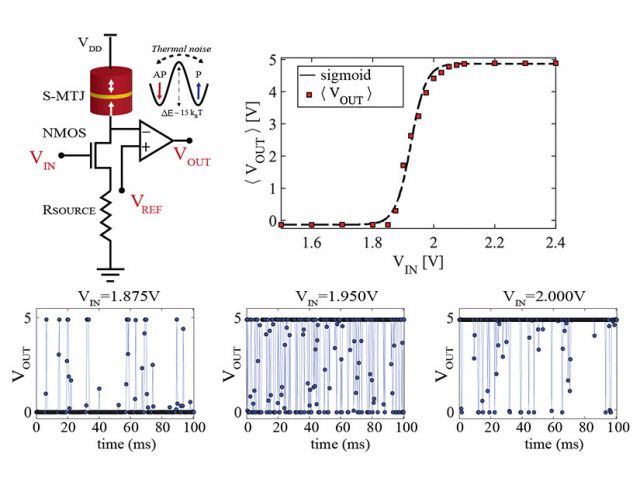
ECE Lab Focus
Kerem Camsari's OPUS Lab
Orchestrating Physics for Unconventional Systems (OPUS) Lab has a Physics-to-Systems focus that aims to exploit the unique features of novel materials and phenomena to design and experimentally prototype efficient circuits and architectures. Our philosophy is that such an interdisciplinary approach that connects materials, devices and circuits to architectures and algorithms is essential in the new era of electronics that will be driven by heterogeneous systems in domain-specific contexts.
Areas of Research include but are not limited to:
- Physics-based Modeling and Prototyping
- Domain-specific Devices and Circuits
- Domain-specific Architectures and Algorithms
Main Areas of Research

Physics-based Modeling and Prototyping
Our lab seeks to translate emerging materials and phenomena (from the fields of nanoelectronics, spintronics, magnetism among others) into physics-based circuit models that can be used to design benchmark circuits. These benchmarks then lead to behavioral models for higher level design. We work closely with experimentalists to calibrate models that are obtained in combination with available experiments and theoretical tools, sometimes starting from first principles techniques (quantum transport by NEGF methods) and sometimes from phenomenological models (semiclassical transport, spin-diffusion, statistical mechanics-based models).

Domain-specific Devices and Circuits
Designing efficient devices and circuits with novel functionalities often involves mapping unique features of underlying materials directly to applications. Using this notion of natural computing where intrinsic physics matches desired functionality, we design and prototype domain-specific, mixed-signal circuits that can be much more efficient than conventional approaches. When appropriate, we explore possibilities of emulations of emerging technology-based circuit and device concepts through microprocessor (Arduino), FPGA, mixed-signal ASIC implementations in order to gauge the scalability of these emerging technologies.

Domain-specific Architectures and Algorithms
We are interested in understanding, deploying and extending algorithms and architectures that best match underlying features of emerging hardware to cater to the ever-growing needs of computation. In particular, we are exploring alternative computing approaches including probabilistic and neuromorphic computing that can be used to design hardware accelerators for domain-specific applications for Optimization and Machine Learning. Matching unique features of emerging technologies with such systems requires us to use hardware-algorithm and hardware-software co-design methods. Additionally, we explore theoretical limits of deterministic, probabilistic and quantum computing through the lens of classical and quantum Monte Carlo techniques and their hardware implementations.
Camsari's Bio
Kerem received his PhD in Electrical and Computer Engineering from Purdue University in 2015, where he continued on as a post-doctoral researcher between 2015 and 2020, before joining the department of Electrical and Computer Engineering in UC Santa Barbara in 2020.
His PhD work established a modular approach to connect a growing set of emerging materials and phenomena to circuits and systems, a framework that has also been adopted by others. In his postdoctoral work, he used this approach to establish the concept of p-bits and p-circuits as a bridge between classical and quantum circuits to design efficient, domain-specific hardware accelerators in the new, beyond-More era of electronics.
Kerem's work has been published in many refereed journals and conferences including Nature, Nature Electronics, Science Advances, Physical Review X. He has delivered more than a dozen invited talks in international conferences and workshops, including American Physical Society (APS) March Meeting in 2016, IEEE Device Research Conference (DRC) in 2017, Magnetism and Magnetic Materials (MMM) Conference in 2017, the IEEE International Electron Devices Meeting (IEDM) in 2019 and the International Conference on VLSI Design (VLSID) in 2020.
Kerem served on the technical program committee for Design, Automation and Test in Europe Conference (DATE) in 2020 and in 2021. He has also served on the technical program committee of the IEEE Conference on Rebooting Computing (ICRC) 2020.
Q & A with New Faculty – Kerem Camsari
Prospective Students
Interested in becoming an OPUS Lab member? Professor Camsari is looking for dedicated and hardworking students to join our team. If you are interested, please apply to the Electrical and Computer Engineering graduate program in the area of Computer Engineering. If you would like to send an email to Professor Camsari about your application, please include your CV and transcripts, as well as a brief description of any past research experience.